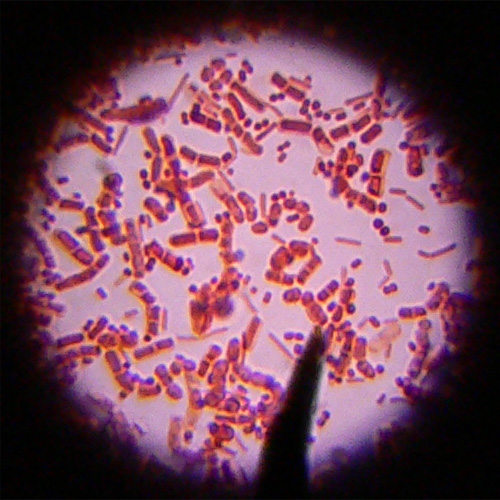Anger And The Brain In Your Gut
by Gina Simmons, Ph.D.
Here’s a little gross-ology for you. Most of what we’re made of is single-celled organisms, and mostly bacteria. Our own cells are outnumbered 10 to 1 by these organisms, mostly bacteria residing in our gut. Research has found that changing the balance of healthy and disease carrying bacteria in the gut can alter brain chemistry making one either more anxious or more bold. Many studies have already shown how the brain can flex its mighty muscle influencing the bacteria in our gut. Dr. Siri Carpenter writes that even mild stress or anxiety can change the balance of healthy gut bacteria making us more prone to infectious diseases. What excites researchers now is the notion that the bacteria in our gut can have a profound effect on our brain biochemistry in multiple ways.

The bacteria in the gut manufacture about 95% of the body’s supply of serotonin, packing a wallop of influence over mood and the gastro-intestinal tract. Serotonin, a neurotransmitter important in the treatment of depression and anxiety, plays a role in the normal functioning of most of the functions of our brain including regulation of mood, appetite, sexual functioning, memory and sleep. Lower levels of serotonin increase irritability, anxiety, depression and anger.
Even a small shift of bacterial balance in the gut can ramp up anxiety levels. In some promising studies with mice, researchers found that anxious mice given water laced with probiotics (helpful bacteria) were less likely to give up during a physical challenge and produced less of the stress hormone, corticosterone (showing a reduction of symptoms of depression and anxiety). In a study published in the British Journal of Nutrition in 2011, researchers found that a 30-day course of probiotic bacteria significantly decreased anxiety and depression in human subjects. Since anxiety and depression play an important role in unhealthy anger, it looks like giving some extra attention to the gut can help.
The more we learn about the gut, it seems it’s got quite a mind of its own, and that might be why many call the gut “the second brain.” What’s good for the brain in our head seems to also help the brain in our gut and vice versa. Taking a few moments to relax before eating helps prepare your stomach to begin digesting your food. This relaxation sends signals from the brain to the body, lowering heart rate and reducing stress. This in turn allows the stomach to better digest the food and get those nutrients working for the body.
To improve the health of your gut naturally, try the following healthy options:
- Exercise: Moderate physical exercise increases levels of serotonin as well as tryptophan, a chemical precursor to serotonin. This persists long after you’ve finished exercising, suggesting that activity builds resilience and is known to improve mood. Exercise reduces psychological stress, improves circulation and lessens pain.
- Light: Daily exposure to bright light increases serotonin levels and improves mood, not only for those with seasonal affective disorder, but for those with mild to moderate depression, premenstrual dysphoric disorder, and pregnant women suffering from depression. Vitamin D deficiency, related to a host of health problems, can be treated with moderate exposure to sunlight.
- Meditation: Helps reduce stress, lower blood pressure, and stimulates improved mood. Look for mindfulness meditation trainings offered at universities and hospitals all over the country.
Some day scientists will likely be able to analyze your gut bacteria to treat your anxiety or depression. We do know that striving for a healthy balance of bacteria in the gut will help your mood and your over all health. What benefits the brain also appears to benefit the gut, your other brain. If you’re wondering whether it is better to follow your brain or your gut, I guess that depends upon whether or not you have a healthy gut.
Photos courtesy of kaibara87 and coordinator_tarun.

